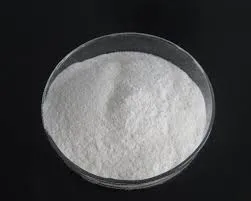
Nov . 27, 2024 19:25 Back to list
Hydroxyethyl Cellulose Producers and Their Role in Various Industries Today
Hydroxyethyl Cellulose An Overview of Its Production and Applications by Manufacturers
Hydroxyethyl cellulose (HEC) is a non-ionic, water-soluble polymer derived from cellulose. It is created through the chemical modification of cellulose fibers to enhance their solubility and functional properties. HEC is widely utilized across various industries, including pharmaceuticals, cosmetics, and construction, due to its thickening, emulsifying, and stabilizing capabilities. In this article, we will explore the manufacturing process of HEC and its diverse applications.
Manufacturing Process of Hydroxyethyl Cellulose
The production of hydroxyethyl cellulose begins with cellulose, which can be sourced from natural materials like wood pulp or cotton. The cellulose undergoes a series of chemical reactions to modify its structure. The primary process involves etherification, where ethylene oxide is introduced to the cellulose in an alkaline medium. This reaction introduces hydroxyethyl groups to the cellulose backbone, creating hydroxyethyl cellulose.
Manufacturers must carefully control several parameters during the production process, including the concentration of reagents, temperature, and reaction time. The degree of substitution—the average number of hydroxyethyl groups per glucose unit in the cellulose—determines the solubility and viscosity of the final product. By varying these parameters, manufacturers can produce HEC with tailored properties suitable for specific applications.
Following the etherification process, the raw HEC undergoes purification to remove unreacted raw materials and by-products. This purification process is crucial for ensuring the quality and functionality of the final product. After purification, HEC is typically dried and ground into a fine powder, making it easy to transport and use in various formulations.
Applications of Hydroxyethyl Cellulose
The versatility of hydroxyethyl cellulose allows it to be used in a wide range of applications
hydroxyethyl cellulose manufacturer

1. Pharmaceuticals HEC is commonly used as a binder and thickener in the formulation of tablets and suspensions. Its ability to retain moisture makes it an essential ingredient in gel formulations and making drug delivery systems more efficient. In ocular preparations, HEC serves as a lubricant, enhancing comfort and efficacy.
2. Cosmetics and Personal Care Products In the cosmetics industry, HEC is valued for its thickening and stabilizing properties. It is present in shampoos, lotions, creams, and gels, providing a smooth texture and improving the consistency of products. HEC also enhances the spreadability and film-forming properties, making it a popular choice in moisturizing products.
3. Construction Hydroxyethyl cellulose is extensively utilized in the construction sector, particularly in cement and gypsum-based products. It acts as a thickening agent that improves the workability and adhesion of mortars and plasters. Moreover, its water-retention capabilities help in preventing cracking and ensure long-lasting results in building applications.
4. Food Industry Although less common, HEC finds applications in the food industry as a thickening and stabilizing agent in sauces, dressings, and dairy products. It enhances the texture and mouthfeel, providing a desirable consistency in various food formulations.
5. Agriculture In agriculture, HEC is used in the production of controlled-release fertilizers and as a thickening agent in herbicides and pesticides. Its ability to form stable emulsions ensures uniform application, improving effectiveness and reducing environmental impact.
Conclusion
The role of hydroxyethyl cellulose manufacturers is paramount in producing high-quality products that meet the diverse needs of various industries. As demand for eco-friendly and versatile materials continues to rise, HEC stands out as a sustainable choice, offering performance benefits without compromising safety. With continuous advancements in production technology and a growing understanding of its capabilities, hydroxyethyl cellulose is set to remain a crucial ingredient in myriad applications, enhancing both the functionality and effectiveness of consumer products worldwide.
-
Versatile Hpmc Uses in Different Industries
NewsJun.19,2025
-
Redispersible Powder's Role in Enhancing Durability of Construction Products
NewsJun.19,2025
-
Hydroxyethyl Cellulose Applications Driving Green Industrial Processes
NewsJun.19,2025
-
Exploring Different Redispersible Polymer Powder
NewsJun.19,2025
-
Choosing the Right Mortar Bonding Agent
NewsJun.19,2025
-
Applications and Significance of China Hpmc in Modern Industries
NewsJun.19,2025







